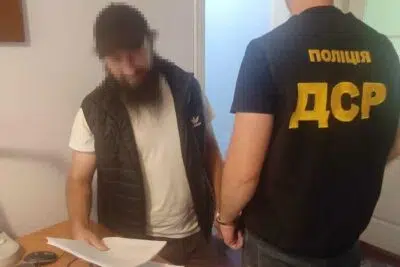JUSTICE—UKRAINIAN STYLE
Gennady Shkliarevsky
The coverage of the war in Ukraine by Western MSM overwhelmingly focuses on the atrocities by the Russian forces and the suffering of the Ukrainian people. Yet there is certainly more complexity to the situation in Ukraine than what reaches the Western public. We rarely, if at all, hear about policies of the Ukrainian government that would do more than just raise brows among Western readers. Here is one case that illustrates this point.
This case was pursued by the Ukrainian government against a local Orthodox priest in the Konotop district of Ukraine. The government has accused the 37-year-old priest of collaborating with the Russian forces—an accusation that carries a punishment of 5 years in jail. The Konotop circuit prosecutor’s office conducted the investigation under the direction of the Investigative Office of the Chief Administration of the National Police of Ukraine with materials and operational data provided by the Administration of the Department of Strategic Investigations for the Sumy. The list of high-level investigative and prosecuting agencies involved in this case is impressive, indicating that the case must be very serious. However, reading the details of the case certainly proves to be anti-climactic, if not outright trivial.
The prosecution claims that the priest collected food from his parishioners and handed it to over Russian soldiers. Another point of the accusation is that the priest allowed Russian soldiers to use his vehicle to go around the village. In addition, the investigators found out that the priest was guilty of conducting pro-Russia propaganda by telling the members of his parish that the possibility that Russians would destroy the church they were constructing in their village was small.
One does not have to be a particularly insightful investigator to put these “crimes” into the context of what was likely happening in this village when it was taken by Russians. The main accusation is that the priest collected food and gave it to the Russians. The accusation is totally silent on one critical issue, whether this action was voluntary or in response to the demand of the Russian soldiers. The latter is certainly more likely. In all wars, soldiers always took food from locals. If the priest had not collected food, the soldiers, in this case, would have most likely gone on a rampage and gotten food on their own, which would have certainly been messy and may have even resulted in casualties. The soldiers would have gotten their food anyway. This simple consideration present puts the whole episode in a very different light: the priest appears to be a savior who tried to spare his parishioners from a very high possibility of violence.
The circumstances of the case also warrant a different view of another point of the accusation—the fact that the priest allowed soldiers to use his vehicle. Let’s, for a moment, imagine the situation on the ground when this episode took place. A group of armed soldiers “asked” the priest’s “permission” to use his vehicle. Does anyone believe that withholding permission would stop the soldiers or they would not seize a vehicle from another person in the village? Again, the motivation of the priest appears to be spare the members of his parish from the violence of the armed people.
Finally, the accusation of pro-Russian propaganda looks totally ridiculous. Think of the circumstances. The members of the parish are building a church for the village—a considerable effort for a small village. Obviously, they are concerned about the possibility that Russians might destroy their church. However, they and the priest also need the church and want to complete their project. The priest tells them that the likelihood of their church being destroyed is very small, and they can finish the project. The prosecutors qualify this episode as an act of pro-Russian propaganda.
Despite all these loopholes, the authorities classify all these actions by the priest as a crime. Moreover, they also publicize the case nationally in dozens of newspapers and television programs. Why? The only reason for such publicity can only be to send a clear message to common Ukrainians: If you do not actively resist the Russian forces (trained guys with guns), you are committing a crime. This message is in the same category as the order that Stalin issued in WWII that Russian soldiers must die rather than surrender to the Nazis. In some sense, the message sent by the Ukrainian authorities is even worse since it is directed at civilians who are certainly not equipped for resistance. Even Stalin understood that people were in desperate situations and had no one to protect them.
The case of the priest in the Konotop has also bolstered the government actions directed against the Russian Orthodox Church. Following the case, there has been a wave of bans on Church activities in townships and villages.

~~~
Dr. Gennady Shkliarevsky is a Professor Emeritus of History at Bard College.




Circumstances are suggesting the Ukrainian forces are waging an all out war against the civilian population of Donbass and Kherson, among others. Early on Ukrainian forces were attacking Russian forces at every opportunity. This resulted in return fire wiping out majorities of Ukrainians. From there the Ukrainians set up firing positions in all manner of civilian areas. This didn’t stop… Read more »
I agree with most of what you say. You seem to know a great deal.